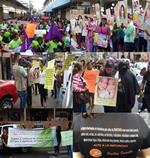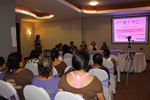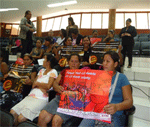Honduras
Published on Sat, 2016-07-30 12:21
Honduras has committed itself to implementing the 2030 Agenda and this commitment is essential to overcoming the pervasive violence in the country. Honduras has the highest level of economic inequality in Latin America and is listed as the most violent of all countries that are not in a war situation. Women's lives are particularly at risk, which means that achieving gender equality and empowering all women and girls by 2030, as mandated by SDG 5, will be a major challenge. More than 18,000 women and girls reported suffering sexual violence between 2010 and 2015, but in less than 6 percent of the cases have perpetrators been condemned. Implementing the SDGs requires political and the reallocation of resources currently devoted to re-militarization, it is clear that human rights are not the priority. Only if social organizations, with the support of the international community, encourage compliance may the situation of the Honduran people improve. |
|
Honduras has committed itself to implementing the 2030 Agenda and its Sustainable Development Goals adopted by the UN General Assembly in September 2015. This commitment is essential to overcoming the pervasive violence that is destroying people’s lives.
Women’s lives are particularly at risk, which means that achieving gender equality and empowering all women and girls by 2030, as mandated by SDG 5, will be a major challenge. Women’s rights are continuing to suffer major setbacks with the increasing concentration of power in the Presidency of the Republic.
Implementing the SDGs, however, requires political will and as resources are increasingly allocated to re-militarization, it is clear that human rights are not the priority. Only if social organizations, with the support of the international community, encourage compliance may the situation of the Honduran people improve.
|
Published on Thu, 2014-10-09 14:29
As the discussion about the national budget of Honduras are starting, women and feminist organizations assembled in different platforms and local networks, have started to demand participation in the debate. The situation of most Honduran women is precarious, they argue, having to face poverty and violence in their everyday life. Violence comes from their own family environment, from organized crime and from the repressive bodies of the State. |
| Source: . Published on Mon, 2013-03-04 23:00 |
Published on Thu, 2013-02-28 17:22
The Center for Women's Studies-Honduras (CEM-H), the Center for Women's Rights, the Women's Network of Colonia Ramón Amaya Amador, the Women's Network of Manzanal, the Women's Network of the Red Cross Col were present on February 22 before Congress in order to lobby and monitor that the proposal for a typification of femicide coordinated with the Ministry of Human Rights and Justice is in line with the work performed for more than ten years by feminist organizations for the construction of an offense that punishes men who kill women because they are women. The typification of femicide means to improve the registration systems of the judiciary, as well as to review and elaborate necessary, relevant and timely legislation for the recognition and punishment of other forms of violence against women. |
|
The main obstacle to sustainable development in Honduras is violence, which affects almost every stratum of society, in both urban and rural areas. People in general, and women in particular, are overwhelmed by a seemingly unstoppable wave of violent crime that has given the country the highest murder rate in the world. Despite other urgent issues, including environmental degradation, economic inequality, poor school performance and limited access to health services, priority must go to reducing the staggering levels of violence.
Since the majority of victims are women, a gender-sensitive approach is imperative.
|
Published on Wed, 2011-09-07 09:24
Sources: CEM-H, Minga Informativa de Movimientos Sociales, El Heraldo The civil society organizations that make up the Commission against Femicide (the murder of women) in Honduras expressed last week their indignation and concern at the increase in this phenomenon in the country and the fact that the authorities are showing "little or no interest" in it. They warned that “Femicide is an extreme expression of violence against women based on men’s power to control and dominate us, our bodies and our lives". |
|
In the wake of the 2009 coup d’état the country is in serious regression in all aspects but mainly as regards human rights, which are being violated with impunity. A people’s movement quickly came together to resist the oppression and a National Front against the Coup was formed, but in the corridors of power there is no political will to pursue remedy social ills or pursue the Millennium Development Goals (MDGs). In this situation what Honduras needs is not just to implement a reform but to lay new foundations for the State.
|
Published on Thu, 2009-09-17 14:04
 Since June 28, Honduras has been immersed in a deep political crisis, which was the day in which the Armed Forces – backed by right-wing political parties, the business sector, the Supreme Court, the Catholic Church, and the majority of the mass media – committed a coup d´etat against the elected President Manuel Zelaya. At the moment that the coup d´etat took place, President Zelaya had an approval rating of close to 60%. |
|
Honduras is one of the poorest countries in Latin America. The international financial crisis already predicted that life would be even more difficult for the Honduran population, but the coup d’état, supported by the most reactionary sectors of society – in particular the defenders of the patriarchal culture – has exacerbated the situation. Social organizations, in particular women’s movements, are organizing the resistance against the de facto regime.
|
SUSCRIBE TO OUR NEWSLETTER







